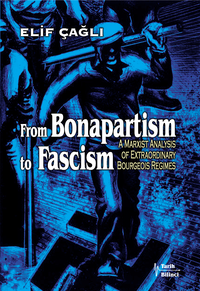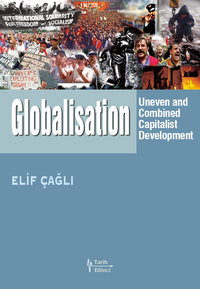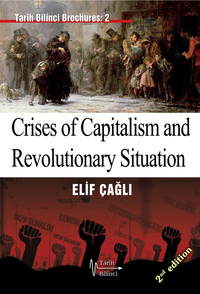The relationship between the economic crises of capitalism and the struggle of the working class should not be interpreted in a mechanical manner. Rather, it must be analysed on the basis of the dialectical relationship between various objective and subjective factors that determine the actual course of events. Economic crisis does not automatically lead to an upsurge of the revolutionary struggle of the working class. The mutual interaction between economy and politics has a much more complex nature. The way workers respond to crisis is determined by various factors such as the political and organisational level of the workers’ movement, its general mood, its determination to combat, or exhaustion. Under unfavourable circumstances, the working class may suffer setbacks in the face of economic crisis, allowing bourgeoisie to heave a sigh of relief.
This was, for instance, the reason attributed by Trotsky to the relative stability secured by imperialism following the First World War: “... the initial and basic cause –the so-called ‘stabilization’– lies in the contradiction between the general disorganisation of the economic and social position of capitalist Europe and the colonial East on the one hand, and the weakness, unpreparedness, irresolution of the communist parties and the vicious errors of their leadership on the other.”[1] In contrast, more favourable conditions, where the working class is self-confident under proper leadership, can have an impact on economy, making economic crisis even more arduous for the bourgeoisie. There are indeed many cases, where the working class refused to bear the burden of the crisis, and even heightened the struggle for better living and working conditions, making the bourgeois order face mounting problems. In such cases, a capitalist economy that suffers under crisis may fall behind in the competition and lose ground in the markets it once dominated.
The successful blows dealt to the capitalist system by the working class deprive the bourgeoisie of escape routes out of crisis, whereas failed attempts enable it to find a way out. This has been proved in many historical cases. To exemplify, we may recall the Popular Front experiments in Spain and France that promoted class-conciliation and avoided confronting capitalism head-on. Likewise, one may remember the class-collaborationist line followed in Turkey in the pre-1980 era. A closer look at such cases reveals that the working class was plunged into despair as a result of the disastrous policies pursued by so-called revolutionary organisations. Thus, the bourgeoisie had a free hand to solve its economic problems through oppressive regimes such as fascism.
Again, when we examine historical cases, we can see that economic crises may trigger revolution, while they are also able to drag the working class movement into a general standstill or even setback. For instance, in 1851, when the economic boom in Europe was at its peak, Marx and Engels remarked that the revolutionary wave of 1848 had ebbed. Drawing his conclusion on the basis of the relationship between revolution and crisis, Engels said that while the crisis of 1847 was the mother of revolution, the boom of 1849-51 was the mother of triumphant counter-revolution. This was, however, not a general rule, but a product of the conditions at that particular period. Indeed, the same emphasis can be seen in Trotsky’s writings on the matter who says that it would be very one-sided and utterly false to argue that a crisis invariably engenders revolutionary action while a boom, on the contrary, pacifies the working class. As he underlines, the revolution of 1848 was not born out of the crisis mechanically. Rather, the crisis provided the last impetus for the explosion of contradictions.
A further example can be drawn from the period leading up to the Russian revolution. The defeat of the 1905 revolution gave way to a period of reaction during which many revolutionary Marxists thought that an economic recovery would pave the way for the resurgence of the revolutionary workers’ movement in Russia. And that was precisely what happened. The economic improvement throughout 1910-12 was accompanied by an upsurge of the workers’ movement that had been demoralized and devitalized as a result of the defeat. Re-awakening to the key role it plays as a class in the capitalist production process, the proletariat got up off its knees. With its morale boosted by gains in economic struggle, it went on the offensive in the political arena. In short, the relative prosperity enjoyed by capitalism for a period did not restrain the militant workers’ movement, but rather set the stage for a revolutionary upsurge.
Drawing a conclusion from such experiences, Trotsky says that an improvement in economic conjuncture and a relative rise in living standards can have a propitious effect upon the revolution, rather than a harmful one. In his view, the focal point in the debates on this kind of subjects is to grasp the true character of the long-term development curve, rather than confining oneself to the observation of mere conjunctural changes. For instance, as regards the 1848 period, the crisis was shallow and transient, while the conjuncture of recovery and upswing was rather strong. Consequently, revolutionary wave subsided. But as for the periods of deep economic crisis such as the Great Depression or the present one, the improvements in economy are weak and temporary in character. Therefore, leaving aside the other factors that influence the process, it can be said that such changes are rather limited in terms of the adverse effect they exert on the revolutionary wave.
As historical examples demonstrate, concrete reality has diverse and complex aspects. Keeping this crucial point in mind, one can still claim that economic crises, where workers and toilers slide ever deeper into poverty, are of vital importance to the revolutionary forces of the working class. For, under conditions favourable enough for an upsurge of the working-class movement, crisis can serve to draw the mass of the working class into a widespread economic struggle that acquires an increasingly militant character. No wonder Lenin attached particular importance to the periods where poverty and economic struggle among the proletariat intensified. When he observed an increase in the activity of the working class in terms of economic struggle, he brought this to the party’s attention. He pointed out that all upsurges of the revolutionary movement began on the basis of mass economic movements. In February 1907, he set the following task before the fifth congress of the RSDLP: “The greatest possible number of Party members must be concentrated on economic agitation among the masses.”[2]
How can anyone deny that major economic crises remove the veneer that leads the masses to delusions over capitalist system? Such periods are extremely important historical episodes as demonstrated today by the revolutionary situations that emerge one after another in Latin America. Leading to a general change in mood among the toiling masses, crises have a revitalising effect even on revolutionary leaders. Let us remind Marx and Engels’s approach to crisis. Towards the end of 1856, when they were expecting a new revolutionary upheaval, Marx wrote to Engels, “Although I am in serious financial difficulties myself I have not felt so happy since 1849 as I do today in face of this eruption.” And Engels replied, “The bourgeois mud of the past few years had stuck to me to a certain extent after all, but now it will be washed off and I shall feel a new man. The crisis will do my health as much good as a seaside holiday, I can feel that already.”[3]
All these remarks are perfectly true. What is equally true, however, is that even the most seemingly spontaneous upsurges and declines in mass movement are strictly linked to the subjective factors of the revolution. The reality is that when the level of its revolutionary consciousness and organisation is low, the working class cannot give a revolutionary response even to the most severe crisis. Rather, it is more likely to regress altogether out of fear of losing jobs, future anxiety and deep concerns. As seen in the case of Turkey, recent economic crises, which came after long years of reaction where workers’ movement received heavy blows, did not engender a revolutionary situation. On the contrary, the threat of job loss was hanging like a sword of Damocles even over the most basic economic struggle. In order to improve the general mood of the working class and raise the level of militancy under such circumstances, it is of utmost importance to achieve certain gains, albeit modest ones, in the field of economic struggle. A closer look at this matter confronts one with problems in the trade union movement. The union bureaucracy is playing a treacherous role, while workers lack necessary consciousness and organisation even in the sense of economic struggle. These are bitter realities of today’s Turkey.
In short, it is impossible to arrive at any correct conclusion regarding the relationship between economic situation and the revolutionary struggle by ruling out the subjective factor, relying merely on economic analyses. It is not the economic crisis that will seal the fate of the class struggle, but rather the factors such as the general political conditions in the world and the state of world workers’ movement. Marxism categorically rejects the idea that subjective factors of the revolution have no influence on its objective conditions. It is quite possible for a revolutionary situation, which resulted from a profound economic crisis, to languish in a short span of time under conditions where the working class is not adequately organised to overthrow the capitalist system. In such a case, the bourgeoisie would seize the opportunity and step up the exploitation of the working class, thus securing another period of economic recovery.
[1] Trotsky, The Third International After Lenin, p.83
[2] Lenin, Collected Works, Vol.12, p.142
[3] Franz Mehring, Karl Marx: The Story of His Life, p.254
link: Elif Çağlı, The Relationship Between Crisis and Revolution, 2 November 2003, https://enternasyonalizm.org/node/610






